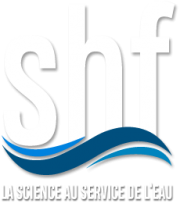Tension on the water
Presentation
Since 2009, the SHF, AFEID, the Académie de l’Eau and ASTEE have been conducting cross-disciplinary and cross-sector reflections on forward-looking approaches to water management in a context of global change.
An initial seminar was held in Paris on 25 and 26 May 2011. It provided an opportunity to summarise the representations of the main water-related tensions on a global scale, based on several forward-looking studies. A second seminar was held on 30 and 31 May 2013, focusing on the French national perspective in the European and Mediterranean contexts.
A summary report published in January 2014 stated that:
- The risk of water crises by 2050 is well established in Europe and the Mediterranean basin,
- The human factor will be particularly important in the ability of modern societies to cope with tensions over water and to make choices,
- Adaptation policies will need to be put in place.
A third symposium organised by the SHF, the AFEID and the Académie de l’Eau, with the support of the Union des Ingénieurs et Scientifiques Francophones, was held from 7 to 9 October 2015 at the Ecole des Ponts ParisTech in Marne-la-Vallée. It provided an opportunity to look in greater depth at issues relating to future tensions over water management in Europe and the Mediterranean basin between now and 2050.
Finally, in November 2019, a new seminar at the Ecole des Ponts ParisTech in Marne-la-Vallée, posed the question of ‘How do tensions over water lead to rethinking its governance?’ The aim was to examine how the human and social sciences can contribute to meeting this challenge.
Activity
The group has produced a summary document entitled: ‘Water tensions and associated crises in Europe and the Mediterranean basin by 2050’.
This report, based on the work of the Tensions sur l’Eau inter-associative group, summarises the main known elements characterising the influence of global changes on water resource deficits, and the consequences for rivers and aquifers.
It covers Europe and the Mediterranean basin. It provides an introduction to the threats that pressure on water resources will pose to the sustainability of aquifers and the quality of their water, to the quality of the environment and biodiversity, and to human activities, particularly agriculture and hydroelectricity, with a particular focus on the southern Mediterranean.
It presents a toolbox of adaptable solutions, including water transfers and storage solutions (reservoirs), desalination, reducing losses and recycling water, as well as the use of new agricultural practices. He stresses the need for knowledge of local situations, with reliable physical and socio-economic data, and raises questions of governance.
CO-ANIMATORS
- Marc-Antoine Martin (Académie de l’eau)
- Jean Verdier (AFEID)
- Pierre-Louis Viollet (SHF)

A QUESTION ?
A COMMENT ?
Do not hesitate to ask us your questions or send us your comments, photos or documents via our contact form
